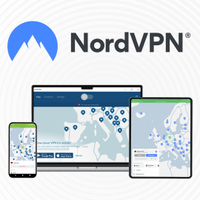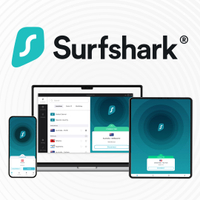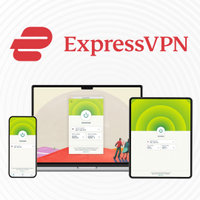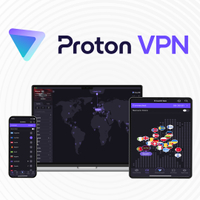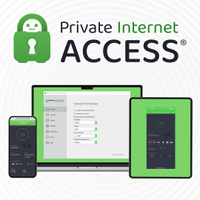The best Windows VPN for PC in 2025
Secure your desktop and put a stop to third-party snooping
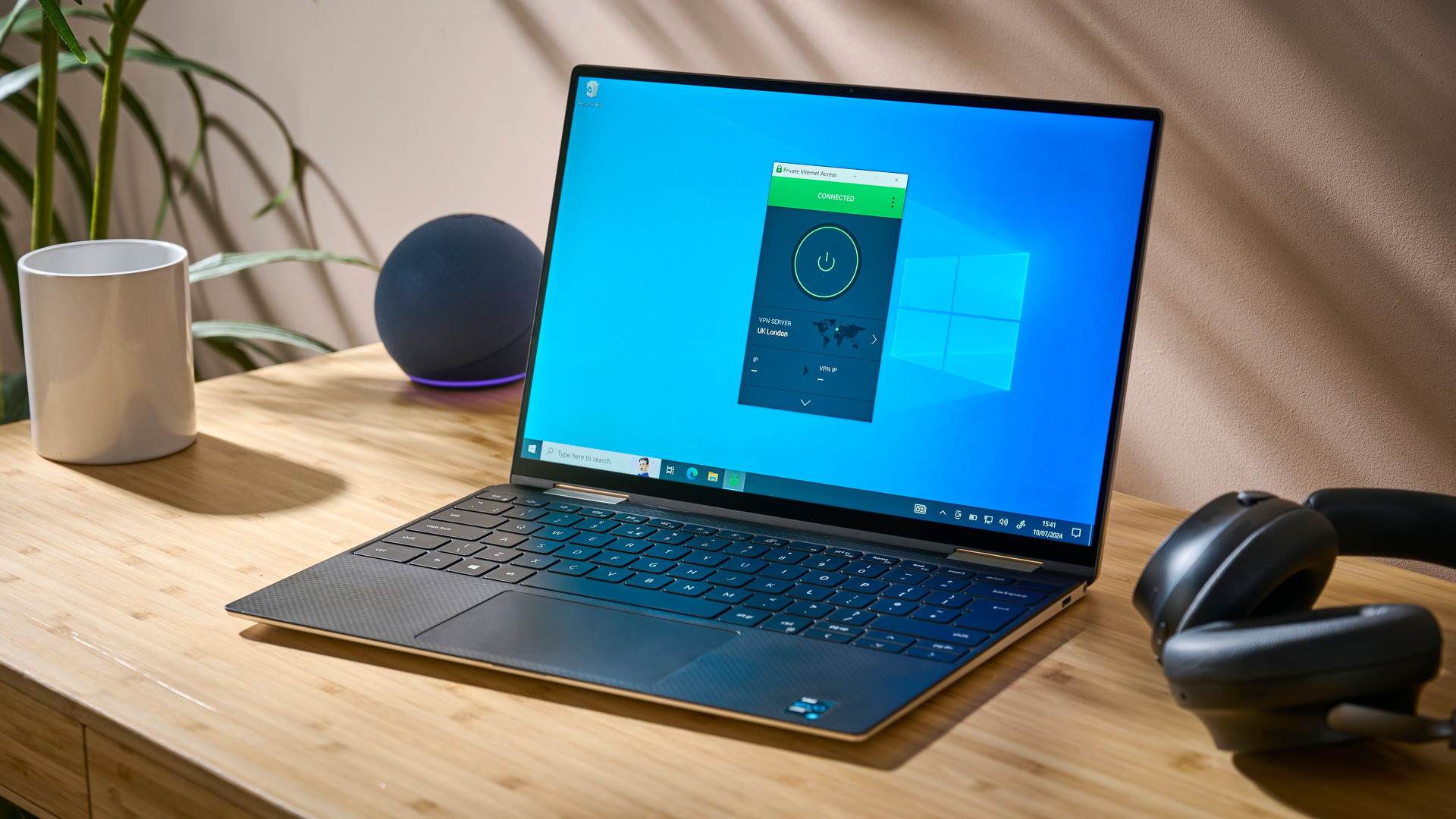
Looking for the very best Windows VPN on the market? You've come to the right place. This guide is designed to help you find the best service for you (and all your Windows devices).
NordVPN is the best Windows VPN right now. Surfshark and ExpressVPN are stellar alternatives, too, and come packed with the security tools you need to protect your Windows device and your digital privacy. The TechRadar team has spent more than 11 years putting today’s best VPNs to the test, so we’re confident you won’t go wrong with our top picks.
Keep reading, and we’ll run through the five best VPNs for Windows, comparing their roster of tools, unblocking power, and overall value for money.
5 best Windows VPNs: a quick overview
1. NordVPN – from $3.09 per month
The best VPN overall
NordVPN sits at the top of our overall VPN rankings – for a whole heap of reasons. It’s the best choice for most Windows users (and everyone else), thanks to its easy-to-use apps and seamless sign-up process. Even if you’re new to the world of VPNs, you’ll have no problem getting started. NordVPN's spring sale is in full swing, too, reducing 2-year plans to just $3.09 a month (though you’ll need to pay the total upfront). Interested? See why NordVPN is the top dog with a 30-day money-back guarantee. Read our full NordVPN debrief below ▼
2. Surfshark – from $2.19 per month
The best cheap VPN (and the fastest!)
Surfshark proves you don't have to pay an arm and a leg for a reliable VPN service. It's the best cheap VPN on the market, with lower prices than NordVPN, and it's also the fastest provider we've tested (though you probably won't notice much of a difference between the two). Surfshark's Windows apps are nice and easy to install – but they're slightly more cluttered than ExpressVPN's sleek offering. The fact that you can bag a two-year Starter plan for a measly $2.19 per month is, quite frankly, awesome, especially when you factor in Surfshark's top-notch unblocking power. Just like NordVPN, you can try Surfshark in your own time with a 30-day money-back guarantee. Read our full Surfshark debrief below ▼
3. ExpressVPN – from $4.99 per month
The best VPN for beginners
ExpressVPN is our go-to recommendation for VPN newbies. Set up is a piece of cake, as ExpressVPN handles all the techy configuration for you, and connecting to a VPN server is as easy as tapping the big "Connect" button on the Windows device of your choice. It's also the most secure VPN we've tested, thanks to a long list of extra features designed to keep your personal details under lock and key. Admittedly, ExpressVPN is more expensive than NordVPN and Surfshark, with a two-year plan currently priced at $4.99 a month, so you'll want to opt for them if you're a real bargain hunter. Still, ExpressVPN is a super-secure pick that you can try for yourself with a 30-day money-back guarantee. Read our full ExpressVPN debrief below ▼
4. Proton VPN – from $3.59 per month
The best VPN for privacy
Proton VPN is a security-focused service for privacy-minded Windows users, which is great news if you plan to do any torrenting or remote work on your device. Proton VPN ensures that your identifiable data is kept under wraps from the moment it reaches the VPN server through its journey across the net (and back), so you don't have to worry about anyone looking over your digital shoulder. Plus, Proton VPN's apps recently underwent a refresh, making them much more intuitive. See for yourself with a handy 30-day money-back guarantee. Read our full Proton VPN debrief below ▼
5. PIA - from $2.03 per month
A solid all-rounder for VPN veterans
Private Internet Access (PIA) is a long-standing favorite of digital privacy purists. Its Windows apps are fairly easy to get started with – but the sheer amount of customizability means that PIA is often better suited to advanced users who want to tweak every aspect of their VPN connection for maximum security. With that in mind, though, you can grab a 2-year plan for $2.03, making PIA one of the more wallet-friendly providers on my shortlist. Throw in unlimited simultaneous connections and you get a service that combines value and security, even if it lacks some of the attention to detail and intuitiveness of NordVPN. Try PIA today with a 30-day money-back guarantee. Read our full PIA debrief below ▼
The best Windows VPN services 2025
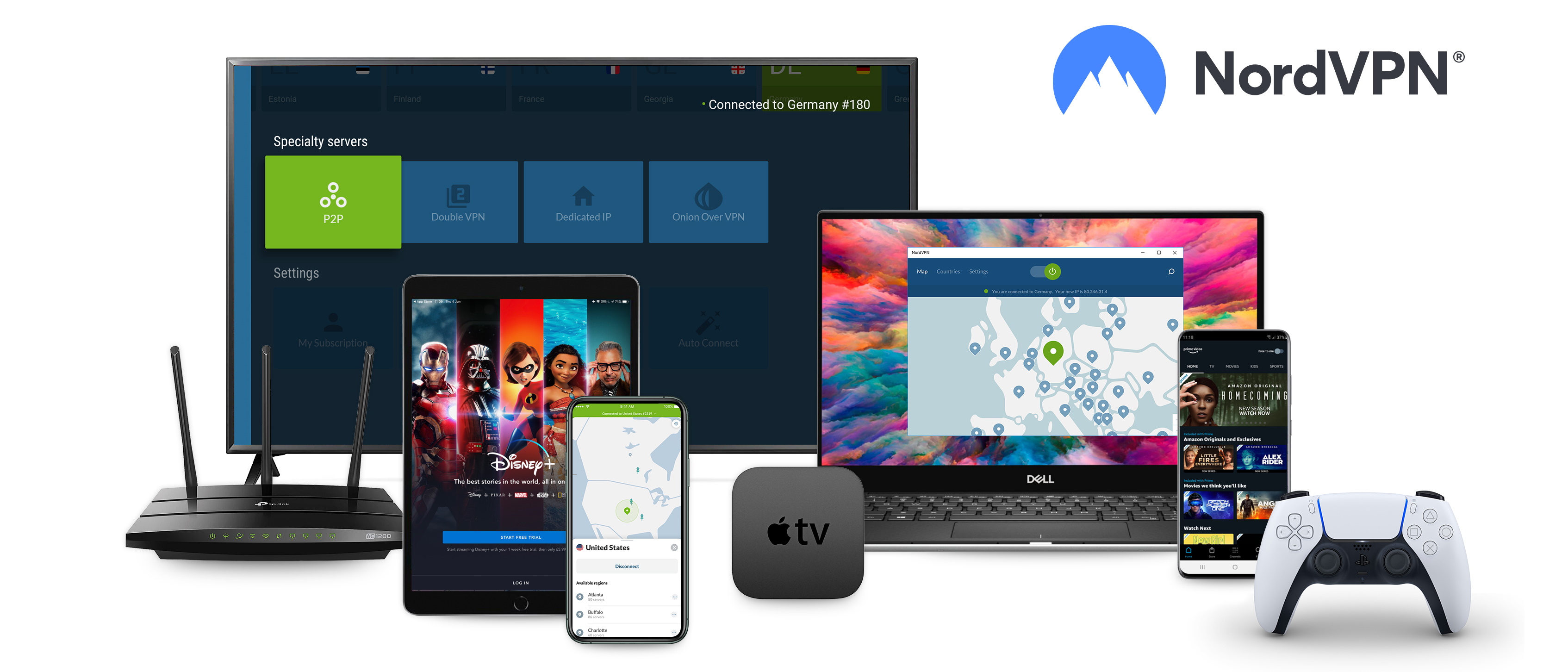
1. NordVPN
When it comes to overall value and ease of use, NordVPN is the best VPN for most Windows users..
NordVPN sits at the top of our overall VPN rankings – it’s the best option for most folks, and the same applies to Windows users. Why? Well, NordVPN is easy to use, modestly priced, and compatible with a wide range of Windows OS versions. It’s everything you need in one handy package.
On the subject of versions, you’ll want to stick with Windows 10 or 11 to reap the benefits of NordVPN’s newest updates and features. However, there is legacy support for x86 versions alongside options for Windows 7 and 8 (though these only receive security updates).
If you’ve got a Copilot+ PC, you’ll be glad to learn that NordVPN has a Windows ARM version stacked with most of the features you’d find on the x64 edition. All in all, this makes NordVPN the most compatible Windows VPN on my shortlist.
READ MORE ABOUT NORDVPN ▼
Ease of Use
Why you can trust TechRadar
First things first, getting started with NordVPN is nice and simple. All you need to do is choose your subscription, download the Windows app via the NordVPN site, and run through the installation process (clicking a few “Next” and “Agree” buttons).
Once the app is up and running, you’re ready to explore NordVPN’s suite of tools. However, the sheer number of tools and information can be overwhelming to new users at first glance (especially if you’ve included extra add-ons when selecting your subscription). Fortunately, NordVPN organizes the app into tabs, and each tool and feature has one, including the main VPN. This is where most users will spend the bulk of their time.
There’s a big “Quick connect” button in the top-left corner of the Windows app. Click it and NordVPN will automatically pair you up with the best available VPN server (depending on your location). You’ll see the red padlock icon turn green once successfully connected. Easy!
Alternatively, if you’d rather pick your server, hit the globe button on the left-hand menu to browse NordVPN’s interactive map. This map is a neat little novelty but, if your Windows device has a small screen, you'll have an easier time scrolling through the more traditional server list.
Streaming
NordVPN is the best streaming VPN on the market. We’ve never had an issue using it with Netflix, Amazon Prime Video, Disney Plus, or smaller region-specific services.
We’ll touch on NordVPN’s speed in more detail later, but in terms of streaming, NordVPN has no trouble keeping up with 4K HDR video – which is great news for anyone planning a movie marathon.
It is worth noting that NordVPN isn’t an ideal pick for torrenting. Unfortunately, there are only a few P2P-optimized servers, so I’d recommend checking out ExpressVPN if you want a more robust file-sharing option.
Privacy & Security
NordVPN doesn’t pull punches preserving your digital privacy. Your data is secured by AES-256 encryption, which ensures no third-party snoopers can peek at what you get up to online. It’s also nice to see NordVPN invest in the future of online security with quantum-safe encryption.
Any VPN worth its salt needs a rock-solid no-logs policy to underscore that it has no interest in collecting or keeping your user logs, and NordVPN delivers.
The VPN recently underwent its fifth independent audit, inviting Deloitte to take a thorough look at how it handles user data – and whether it’s sticking to the terms outlined in its privacy policy. We're pleased to say that NordVPN passed the audit with flying colors.
In addition, NordVPN’s Windows offering comes packed with the security tools that make any good VPN great. This includes a kill switch, which will prevent any data leaks in the event of an unexpected VPN dropout, and a fantastic all-in-one service that rolls malware detection, antivirus, and phishing site detection into a single product: Threat Protection Pro.
Speed & Performance
Whether you use your Windows device for HD streaming, online gaming, or more social media scrolling than you’d care to admit, speed is always an important factor in the overall experience. Luckily, NordVPN is a super-speedy service – one of the quickest providers we’ve tested.
NordVPN regularly clocks in at over 950 Mbps when using its proprietary NordLynx protocol (which is based on WireGuard). To put this number into context, Netflix recommends speeds of 15 Mbps (or higher – up to about 25 Mbps) to stream ultra-HD 4K content.
Surfshark – the best cheap VPN
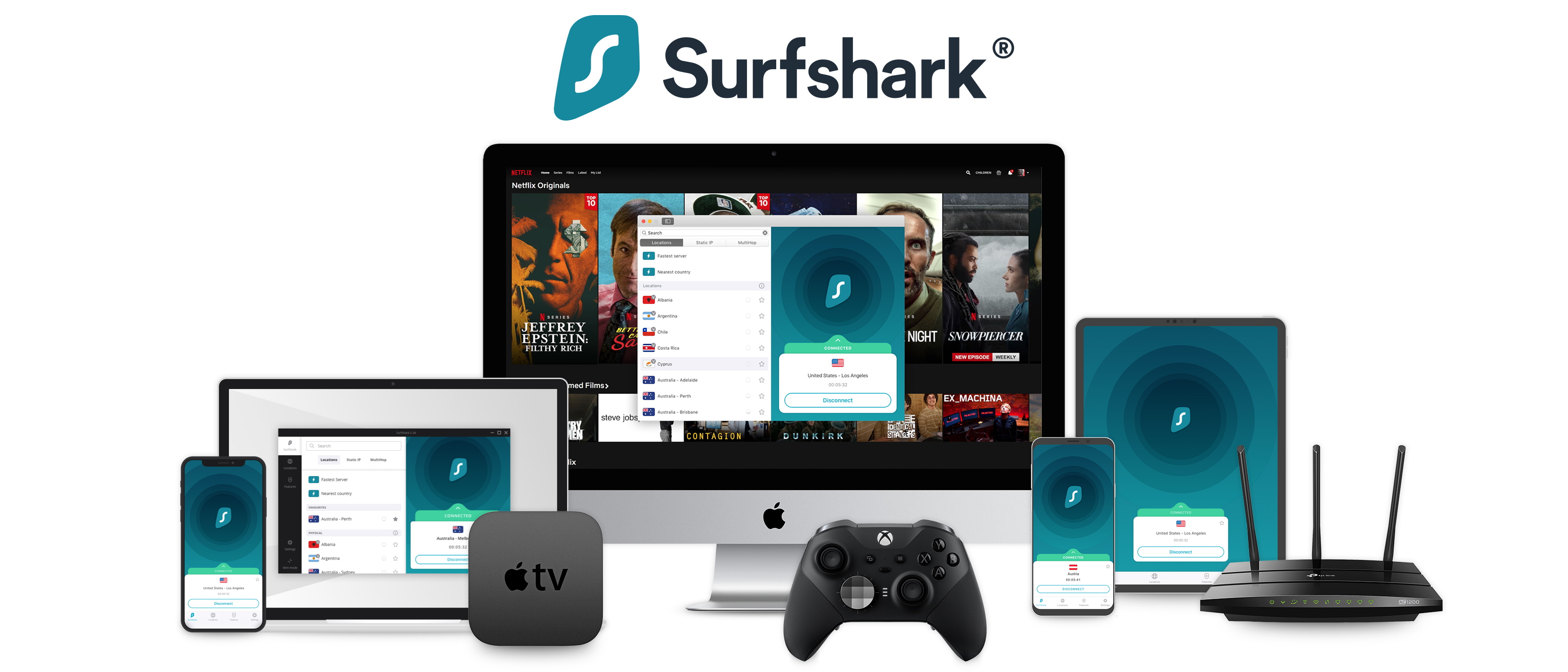
2. Surfshark
Tons of value packed into bargain prices, plus virtually unbeatable
Surfshark is our go-to recommendation for anyone looking for an absolute bargain. It’s today’s best cheap VPN for a reason! It’s less expensive than NordVPN and half the price of ExpressVPN. Plus, to sweeten the pot, Surfshark gives users unlimited simultaneous connections to play with. That means you can share your login with friends and family if you’re feeling generous.
Opt for a multi-year Surfshark plan to bag the best deal, and ensure that you’ve updated to Windows 10 or 11 to get the best out of the provider's tools and privacy. Support for versions older than Windows 10 has ended – and there won’t be any feature updates for Windows 10 x86.
On the brighter side, a Windows ARM app is available for the latest Copilot+ devices, so you won't miss out on Surfshark's security if you're an early adopter.
READ MORE ABOUT SURFSHARK ▼
Ease of Use
Like NordVPN, Surfshark’s installation process is incredibly simple. All you need to do is hop over to the Surfshark site, choose your plan, download the Windows app, and click through the installation wizard. The Windows app will pop up to greet you once you’re done.
Surfshark’s UI is clean, spacious, and intuitive – though there’s little flair to write home about. If you’re a minimalist, though, you’re going to love it.
All of Surfshark’s important menus are listed on the left of the app – and we like how digestible the icons are. Newbies won’t have any issues navigating around the app to adjust their settings or check out Surfshark’s features.
Toggle over to the server list and scroll through at your leisure, investigate recommendations (based on your location), or hit “Quick connect” and let Surfshark decide for you. As per usual, the red icon indicates that you’re not connected to a server, and it’ll turn green when you are.
Streaming
Surfshark has an expansive network of servers across 100 countries – making it a pretty awesome Netflix VPN. What's more, all of its servers are streaming-optimized. Surfshark worked like a charm alongside other popular platforms, too, including Amazon Prime Video, Disney Plus, and Hulu. Fans of British content will be glad to hear that Surfshark is also compatible with BBC iPlayer.
Wondering whether Surfshark holds up as a decent VPN for torrenting? It does – but there are a few caveats. All Surfshark’s servers are P2P-enabled, but there’s no support for port forwarding, which might sour the deal for seasoned torrenters looking for the full package.
Privacy & Security
Surfshark doesn’t take any chances with your digital privacy, employing robust AES-256 encryption to ensure your data is protected as it leaves your Windows device and heads out to the wider internet.
The provider’s airtight no-logs policy has been audited by Deloitte, too, ensuring that your identifiable logs are never stored or used to potentially link you to your internet activity.
Like NordVPN, Surfshark has a roster of additional tools, including a handy CleanWeb browser add-on that’ll make short work of invasive ads that might otherwise spoil your browsing sessions.
The real star of Surfshark’s show is its Alternative ID feature. In a nutshell, it creates an entirely new online persona for you – a new name, email address, and phone number. You can use these details to autofill forms when you’d rather not part with your actual information (and potentially put it in the hands of digital ne’er-do-wells).
Speed & Performance
Let’s cut to the chase – Surfshark is a downright speed demon, currently reigning supreme as the fastest VPN we’ve tested. If you want fast, Surfshark is your best bet.
We recorded speeds of 950 Mbps when using the WireGuard protocol. So, regardless of what you use your trusty Windows device for, you won’t have to worry about your VPN grinding you to a halt. It’s why Surfshark is such a reliable gaming VPN, too.
ExpressVPN – the best VPN for beginners
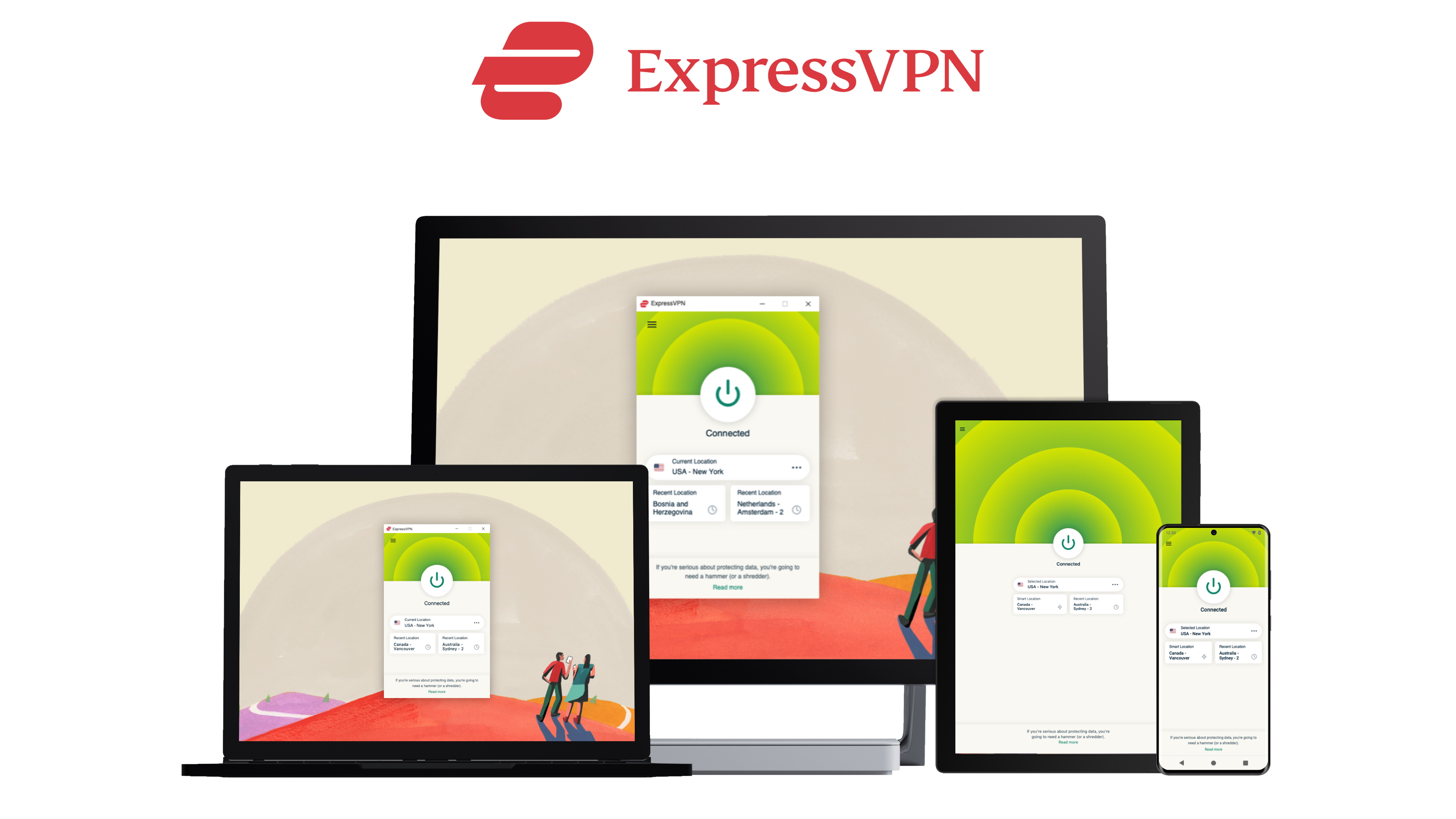
3. ExpressVPN
Stress-free setup and the sleekest apps on the market – ExpressVPN is ideal for VPN newcomers.
ExpressVPN is a huge player in the VPN sphere – and you might’ve heard about it in YouTube sponsorships and ads. It misses out on the top spots for Windows users, however, because it’s not quite as feature-rich as NordVPN or as cost-effective as Surfshark. ExpressVPN is one of the pricier picks available, meaning bargain hunters may want to look elsewhere for better value.
Still, ExpressVPN packs a lot of quality into its subscriptions and Windows apps and focuses on offering a top-notch VPN service that’ll work even if you live in one of the most heavily restricted regions of the globe.
It’s one of the most secure providers you can invest in, after all, and it’s compatible with Windows 10 and 11, as well as Copilot PCs.
READ MORE ABOUT EXPRESSVPN ▼
Ease of Use
ExpressVPN’s initial setup process is pretty straightforward. Pick your plan, head to the main ExpressVPN site, sign in, and download the Windows app via the dashboard. Don’t close the dashboard yet, though, because you’ll also be given an activation code you’ll need to punch in later.
Run through the installation wizard as usual and hand over the activation code when prompted. Then, hit “Continue”, and your shiny new ExpressVPN Windows app is ready to roll.
The app is a delight to use – it’s one of our favorite interfaces. It initially opens up as a square tile and it’s pretty minimal. There’s a big “Connect” button (that’s either red or green, depending on whether you’re currently connected to a server). Hit the server location option to open another tab and take your pick of ExpressVPN’s expansive server network.
We like how compact the ExpressVPN Windows experience is. Something to keep in mind, though, is that different tools, menus, and settings open up in their own tabs/windows, so you’ll need to keep on top of which ones you’re currently using or risk cluttering up your screen.
Streaming
ExpressVPN is a streamer’s dream, able to unblock all of today’s most in-demand streaming platforms. Think Netflix, Hulu, and Amazon Prime Video. Platforms from overseas, and smaller sites, work seamlessly, too – though we did run into hiccups trying to browse Australia’s 10Play.
Generally speaking, we prefer NordVPN when it comes to streaming, as it dropped out fewer times when we did our best to tune into Netflix libraries from the UK while abroad.
In happier news, ExpressVPN is a solid torrenting VPN as all its servers are P2P-enabled. We’d like to see the service invest in port forwarding, however – it’d be the cherry on top of an already tempting cake.
Privacy & Security
ExpressVPN’s security basics are awesome. A solid foundation of AES-256 encryption stops unwanted snooping and data interception, and ExpressVPN has future-proofed its protection to prepare for the onset of quantum computing.
Add TrustedServer technology to the mix (which erases data after every reboot) and you have a service you can trust with your day-to-day browsing and your banking, shopping, and private communications (yes, including your DMs).
Unlike NordVPN, ExpressVPN isn’t stuffed to the brim with extra security tools – which could be a deal breaker for some. Instead, it focuses on its core VPN offering and has undergone a whopping 18 independent audits of its apps, architecture, and privacy policy. It’s an awesome level of transparency that I’d like to see other services emulate.
ExpressVPN isn’t totally bereft of nifty features, however. The Shuffle IP system ensures no identifiable connection between your online persona and your activity. ExpressVPN even has its own password manager, ExpressVPN Keys, that’ll remember all those complex passwords you’re definitely using to secure your online profiles (don’t worry, ExpressVPN Keys can generate them, too).
Speed & Performance
ExpressVPN lives up to its name with stable and impressive speeds. The Lightway protocol, ExpressVPN’s bespoke VPN protocol, clocked in at 898 Mbps during our testing.
That puts the service at the higher end of the performance spectrum, but NordVPN and Surfshark still have it beat. Still, for the average Windows user, this will be more than enough to ensure a smooth online experience when streaming, gaming, and browsing.
Proton VPN – the best VPN for privacy
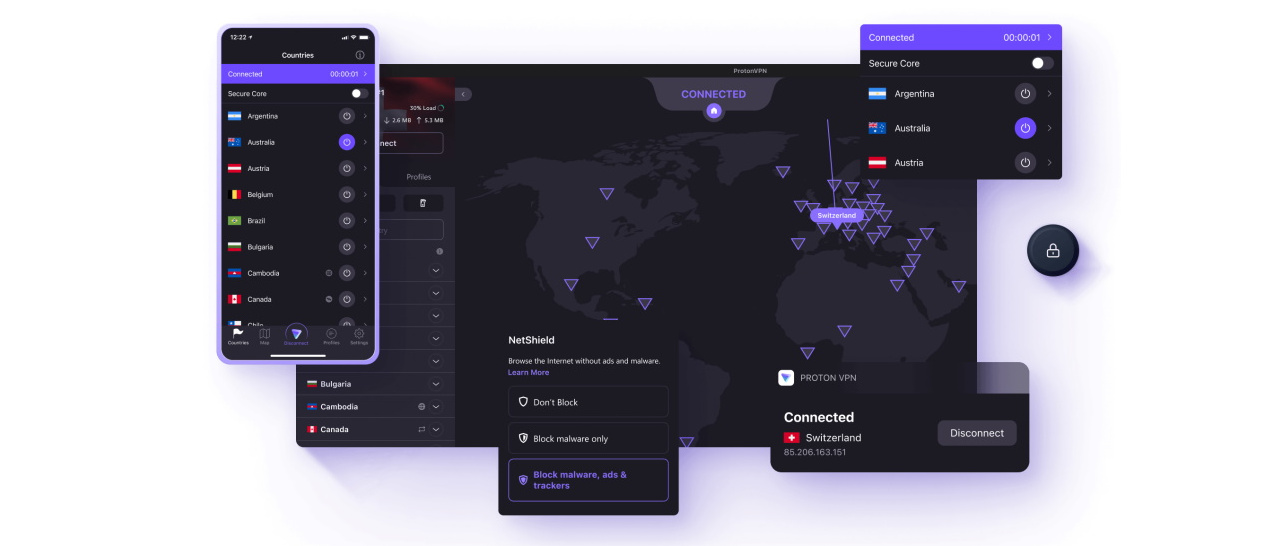
4. Proton VPN
A long list of privacy tools and revamped Windows apps make Proton VPN a solid pick
Proton VPN is the brainchild of the folks behind Proton Mail – and a privacy purist’s dream. So, if the security of your Windows device and identifiable data are your main concerns, it’s worth considering Proton VPN.
There’s even a nifty free VPN option to give a taste of the Proton way of doing things. Plus, it’s one of the only free services I’d recommend using – a pretty serious accolade.
Currently, you can install Proton VPN on any Windows machine running Windows 7 up to Windows 11, though ARM support isn’t yet available.
READ MORE ABOUT PROTON VPN ▼
Ease of Use
Proton VPN’s installation process is straightforward. Pick your plan, download the Windows app from the main Proton VPN site, and let the installation wizard do its thing.
Once the Windows app is ready, open it up, and you’ll see a crisp black and purple UI. We love it – it captures some of the hacker aesthetic without straying too far into gaudy territory.
The server list is nice and easy to navigate – simply hunt down the location of your choice and hit “Connect”. Alternatively, the “Quick connect” button pairs you up with a speedy server automatically.
Next, let’s address the elephant in the room – the big ol’ map of server locations. It’s a fun novelty and can shave a few seconds off the server selection process (provided your geography is pretty strong), but it could clutter up the screen of more compact Windows devices, too.
Streaming
Proton VPN has servers dotted all over the globe and boasts coverage in more countries than any other VPN. We didn’t experience any issues when streaming with Proton VPN, either, and accessed Netflix, Amazon Prime Video, and Disney Plus with a minimum of fuss. Smaller regional services (like ITVX and 9Play) were just as easy to use.
Proton VPN is one of the better choices for torrenting, too, thanks to a selection of P2P-optimized servers. Torrenting enthusiasts will also be glad to learn that Proton VPN does come with port forwarding.
Privacy & Security
Proton VPN was founded by a team of CERN-scientists so, as you might expect, you can rest assured that protecting your digital privacy is priority number one. The provider relies on rock-solid AES-256 encryption to secure data as it travels to and from the Proton VPN servers.
If you want to add an extra layer of protection to things, check out Secure Core – which allows you to route your traffic through an additional server located in a privacy haven. Think Switzerland, Iceland, and Sweden. In practice, this is similar to NordVPN’s Double VPN feature and reduces the risk of your IP address being exposed.
In July 2024, Proton VPN invited Securitum to comb through its no-logs policy –- and the results were excellent. We’d like to see Proton VPN continue its trend of consecutive annual audits. There's no better guarantee that your identifiable logs are in safe hands, after all.
Speed & Performance
Proton VPN clocked in at an impressive 950+ Mbps during our most recent round of testing – which is always great to see. We used the WireGuard protocol to achieve these results, and we recommend sticking to it to ensure the smoothest, speediest performance when using your Windows device.
The VPN Accelerator is a handy little feature you can enable when you need a boost – especially if you’ll be connecting to a server on the other side of the globe. It automatically finds the routes with the best speeds and is generally less effective for short-distance connections.
Private Internet Access – the best VPN for veterans
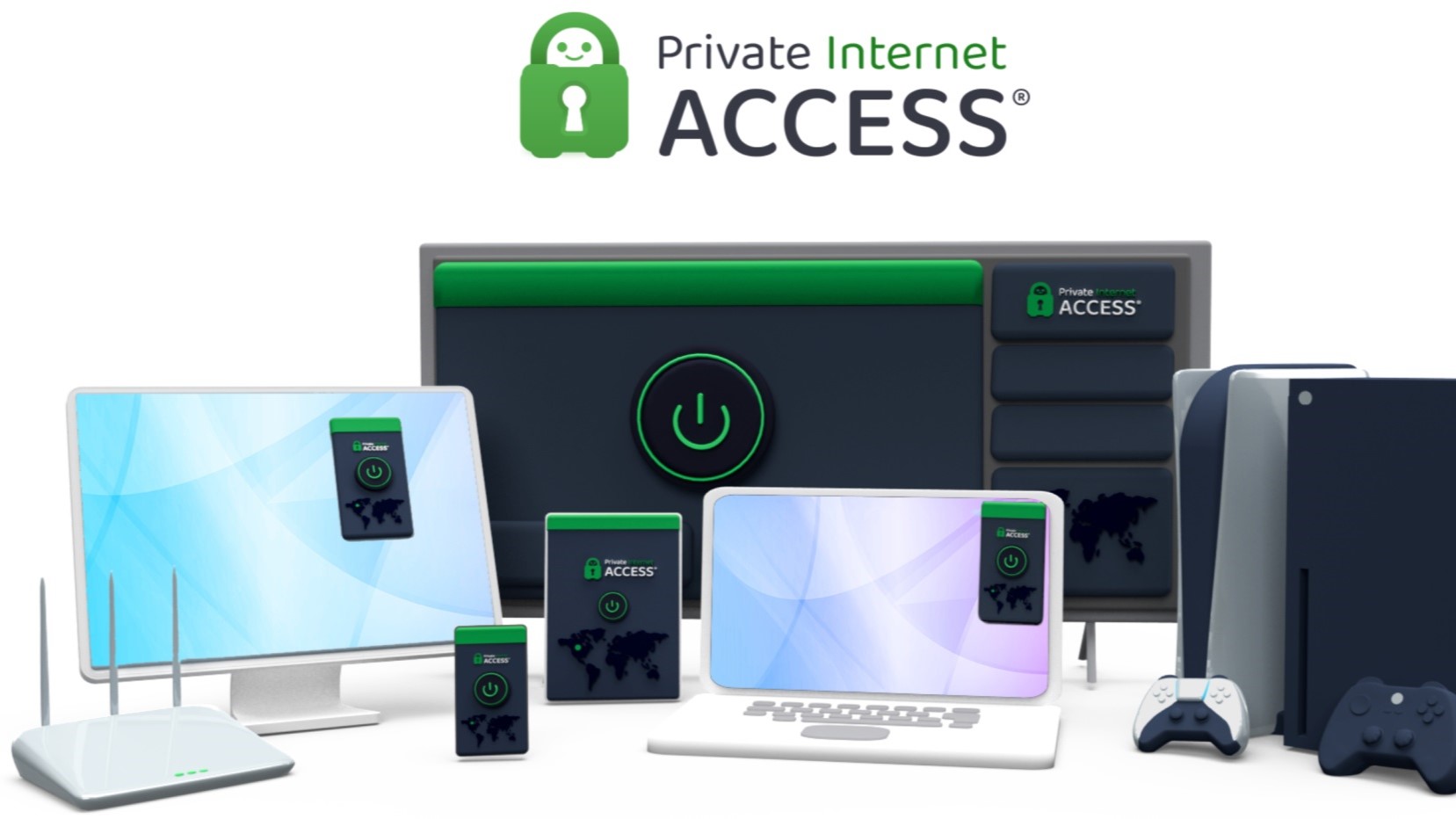
5. Private Internet Access
A budget-friendly option for Windows users who put security first.
Private Internet Access (PIA) rounds off our list – but don’t be fooled into thinking it isn’t worth investigating. Like Proton VPN, it takes a security-first approach with a stacked roster of tools to safeguard you and your Windows device.
We generally recommend PIA to VPN veterans, as it’s hugely customizable. If you want to tweak every aspect of your VPN connection to create a bespoke experience, it could be the service for you.
PIA is compatible with Windows 10 and 11, though it currently lacks a x32 version, which means older devices might be out of luck. On the plus side, PIA has released a beta version for Windows ARM devices, which should work on your Copilot+ devices.
READ MORE ABOUT PRIVATE INTERNET ACCESS ▼
Ease of Use
PIA’s install process follows the same steps as the VPNs listed earlier in this guide – check out the main PIA site to pick your plan and download the Windows app, let the install wizard run wild, and then log in when prompted. It is, in all truth, a piece of cake.
The main PIA Windows app reminds me of ExpressVPN in some ways. Firstly, it opens as a small tile, and different tools, menus, and settings open up in their own tabs. You can customize how the PIA app looks, though, and expand it if you want to see more details at a glance.
The majority of Windows users will spend the most time with the big On/Off button – the Simplified mode – and a smaller tab containing the PIA server list. Just give the button a click to be automatically paired up with a server, or sift through the options to find a specific location.
Streaming
When it comes to streaming with PIA, we had a decent experience – we were able to use all of the big names, for one thing. Netflix, Amazon Prime Video, and Disney Plus worked well enough, and we even checked out smaller regional providers (like Channel 4 and ITV).
If you plan to do some torrenting with your Windows device, PIA is worth checking out, as it comes with a handy port forwarding tool and support for P2P activity. PIA’s speeds aren’t absolutely blazing fast (more on this later), but we think it’s a decent trade-off when you factor in PIA’s stellar security measures.
Privacy & Security
In addition to AES-256 encryption, PIA comes loaded with nifty extras that’ll shore up your online security. The basics are covered, with a kill switch and DNS leak protection, and split-tunneling allows you to pick which sites, services, and apps use PIA’s encryption and which don’t – which is handy if you do any online banking with your Windows PC.
PIA’s no-logs policy has been audited twice by Deloitte, which is great to hear, and actually proven in court on two different occasions. That means that PIA proved that it had no user logs to hand over even when pressured by authorities – the proof is in the pudding, as they say.
Speed & Performance
PIA lags behind the other providers in terms of speed – clocking in at 436 Mbps when using the WireGuard protocol. That doesn’t mean you should write the provider off entirely, however, as this kind of performance will ensure smooth streaming and scrolling when going about your day-to-day business online.
It is worth noting that PIA’s speeds are consistent across the day, too, and boasts noticeably less jitter than other VPNs. So, if you’re hunting for a gaming VPN that balances reliability with security, PIA is up there with the best.
FAQs
Do all VPNs work with Windows?
Yes, most of today's top VPNs are compatible with Windows, provided you're using the most up-to-date version of Windows software
If you're using a legacy version of Windows, however, it's a good idea to check in with your provider. Some VPNs will stop offering support for older versions of Windows, meaning you'll either be unable to use the VPN or you may miss out on critical security updates and new features.
Does Windows have a built-in VPN?
Yes, Windows has a built-in VPN, but it doesn't work in quite the same way as the services on our shortlist.
It's probably more accurate to say that Windows has VPN support. It'll allow you to connect to a corporate VPN, for example, rather than acting as a full-blown service like NordVPN. You can't use it to conceal your original IP address, and it doesn't have staple features like a kill switch.
Ultimately, the built-in Windows VPN is more useful to schools and businesses that want to set up their own VPN and grant remote access.
Does Windows Defender have a VPN?
Windows Defender used to offer a free VPN product – Defender VPN. Unfortunately, as of February 28, 2025, the VPN has been discontinued due to low uptake.
How to use a VPN on Windows?
Using a VPN on Windows is incredibly easy. First, you'll need to pick one of our top-rated Windows VPNs and head to their site. Create an account, pick a plan, and then download the Windows app. Installation is usually straightforward, too – just click through the install wizard and log in to the app when prompted. Then, you're good to go!
Disclaimer
We test and review VPN services in the context of legal recreational uses. For example: 1. Accessing a service from another country (subject to the terms and conditions of that service). 2. Protecting your online security and strengthening your online privacy when abroad. We do not support or condone the illegal or malicious use of VPN services. Consuming pirated content that is paid-for is neither endorsed nor approved by Future Publishing.
Get daily insight, inspiration and deals in your inbox
Sign up for breaking news, reviews, opinion, top tech deals, and more.

River is a Tech Software Editor and VPN expert, helping take care of cybersecurity content on TechRadar, ranging from reviews, buying guides, and must-have VPN deals. River's expertise in the cybersecurity field opened their eyes to the startling amount of online snooping we accept into our daily lives. Now, River is committed to fighting for your right to digital privacy by shining a light on its biggest threats – and helping readers safeguard their data with the help of a VPN. Surfshark is River's favorite VPN, and they use it every day to keep their most sensitive details out of the hands of third-party trackers.
- Rob DunneVPN Editor
